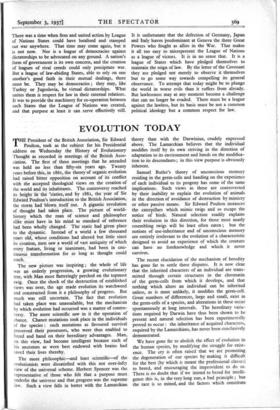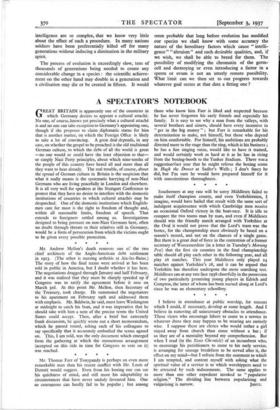EVOLUTION TODAY
THE President of the British Association, Sir Edward Poulton, took as the subject for his Presidential address on Wednesday the History of Evolutionary Thought as recorded in meetings of the British Asso- ciation. The first of these meetings that he attended was held no less than fifty-six years ago. Twenty years before this, in 1861, the theory of organic evolution had raised bitter opposition on account of its conflict with the accepted theological views on the creation of the world and its inhabitants. The controversy reached its height In the 'sixties, and by 188r, the year of Sir Edward Poulton's introduction to the British Association, the storm had blown. itself out. A gigantic revolution of thought had taken place. The picture of world- history which the man of science and philosopher alike must have in his mind as standard of reference had been wholly changed. The static had given place to the dynamic. Instead of a world a few thousand years old, whose conditions had altered but little since its creation, men saw a world of vast antiquity of which every feature, living or inanimate, had been in con- tinuous transformation for as long as thought could reach.
The new picture was inspiring ; the whole of life was an orderly progression, a growing evolutionary tree, with Man most flatteringly perched on the topmost twig. Once the shock of the destruction of established views was over, the age made evolution its watchword and constructed from it a philosophy of progress. But much was still uncertain. The fact that evolution had taken place was unassailable, but the mechanism by which evolution had occurred was a matter of contro- versy. The more scientific saw in it the operation of chance. .Chance mutations took place in the individuals of the species : such mutations as favoured survival preserved their possessors, who were thus enabled to breed and hand on their hereditary advantages. Man, on this view, had become intelligent because such of his ancestors as were best endowed with brains had saved their lives thereby.
The more philosophic—and least scientific—of the evolutionists were dissatisfied with this not over-lofty view of the universal scheme. Herbert Spencer was the representative of those who felt that a purpose must underlie the universe and that progress was the supreme law. Such a view falls in better with the Lamarckian theory than with the Darwinian, crudely expressed above. The Lamarckian believes that the individual modifies itself by its own striving in the direction of adaptation to its environment and hands on the modifica- tion to its descendants ; in this view purpose is obviously inherent.
Samuel Butler's theory of unconscious memory residing in the germ-cells and handing on the experience of each individual to its progeny has some of the same implications. Such views as these are controverted by their inability to explain the evolution of animals in the direction of avoidance of destruction by mimicry or other passive means. Sir Edward Poulton instances' the caterpillars which mimic twigs and so escape the notice of birds. Natural selection readily explains their evolution in this direction, for those most nearly resembling twigs will be least often eaten ; but the notions of use-inheritance and of unconscious memory are entirely irrelevant to the evolution of a characteristic designed to avoid an experience of which the creature can have no foreknowledge and which it never survives.
The recent elucidation of the mechanism of heredity has gone far to settle these disputes. It is now clear that the inherited characters of an individual are trans- mitted through certain structures in the chromatin of the germ-cells from which it develops, and that nothing which alters an individual can be inherited unless, as is most unlikely, it modifies the germ-cell. Great numbers of differences, large and small, exist in the germ-cells of a species, and alterations in these occur spontaneously at long intervals. The hereditary varia- tions required by Darwin have thus been shown to be present and natural selection has been experimentally proved to occur : the inheritance of acquired characters, required by the Lamarckians, has never been conclusively demonstrated.
We have gone far to abolish the effect of evolution in the human species, by modifying the struggle for exist- ence. The cry is often raised that we are promoting the degeneration of our species by making it difficult for the best (by which is meant the professional classes) to breed, and encouraging the improvident to do so. There is no doubt that if we intend to breed for intelli- gence this is, in the very long run, a bad principle ; but the race is so mixed, and the factors which constitute intelligence are so complex, that we know very little about the effect of such a procedure. In many nations soldiers have been preferentially killed off for many generations without inducing a diminution in the military spirit.
The process of evolution is exceedingly slow, tens of thousands of generations being needed to create any considerable change in a species : the scientific achieve- ment on the other hand may double in a generation and a civilisation may die or be created in fifteen. It would seem probable that long before evolution has modified our species we shall know with some accuracy the nature of the hereditary factors which cause " intelli- gence " " altruism" and such desirable qualities, and, if we wish, we shall be able to breed for them. The possibility of modifying the chromatin of the germ- cell and destroying or even introducing a factor in a sperm or ovum is not an utterly remote possibility. What limit can we then set to our progress towards whatever goal seems at that date a fitting one ?











































 Previous page
Previous page